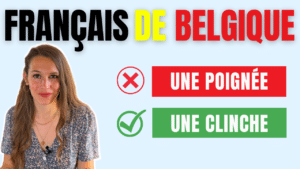In this video, I give you the expressions to know absolutely if you come to France.
These words or expressions are essential because they will help you to better understand everyday situations in France.
- 0:00 - Introduction
- 0:44 - Good morning
- 1:24 - I would like to
- 2:11 - I'd like to
- 2:37 - Please
- 3:17 - Thank you
- 3:51 - No thanks
- 4:46 - Drinking - Eating
- 5:17 - I will take
- 5:53 - The bill
- 6:20 - Excuse me
- 7:13 - I'm sorry
- 7:38 - How much does it cost
- 8:18 - Conclusion
Transcript - 13 essential expressions if you come to France
Hello everyone. I hope you're well and having a good day. Today, we're going to look at some words, phrases or expressions that will be very useful if you go to a French-speaking country where you'll need to speak French. So, these are basic expressions or formulations that you'll use in everyday life or as a tourist. Before you start, don't forget to activate the subtitles, which will make it easier for you to understand the video.
And don't forget to subscribe to the HelloFrench channel so you don't miss a single video. The first word, as we said at the very beginning of the video, is "bonjour". Bonjour, bonjour, ah bonjour de La Bath!
So it's a polite way of greeting someone. So you can use it with your friends when you meet them, but also as soon as you enter a store, a bakery, a restaurant, as soon as you need to start addressing someone.
If you don't say hello when you enter a store, it's pretty impolite. So, in France, you always say "bonjour" when you enter somewhere.
So the second wording we're going to see is "I'd like". Oh Mr. Commissaire, I'd like to introduce you to two foreign colleagues. It comes from the verb vouloir.
So you'd think you'd have to say "je veux", which is the present tense conjugation. But in fact, you have to say "je voudrais", which is a more polite way of saying it, so it's conditional, it's another conjugation and that's how we say it in France to be polite. For example, if you walk into a restaurant, you say "bonjour, je voudrais une table pour deux" ("hello, I'd like a table for two"). Above all, you don't say "bonjour, je veux une table pour deux".
You'll come across as very rude.
Another formulation that's actually a synonym for "I'd like" is j'aimerais.
I would like to place my order please.
For example, if you walk into a bakery, you can say "hello, I'd like a baguette" or "hello, I'd like a baguette". So you can choose, you can alternate. Sometimes say "I'd like", sometimes say "I'd like".
So the following formulation is also a polite formula. It's "please".
I'll have a baguette, please. Tradition?
So when you ask someone for something, whether it's in a restaurant, a store or a bakery. Always end your sentence with "please". It's the polite way to ask for something. For example, you could say "hello, I'd like a baguette please". You can also use "s'il vous plaît" at the beginning of a sentence, for example when entering a bakery, to call attention to something. You could say "hello, please, I'd like a baguette".
The next word is "thank you".
You are very, very French after all. Thank you.
You'll hear this word a lot if you come to France or any other French-speaking country. So if someone gives you something, or a waiter brings you a dish, or the baker gives you a baguette, you always say "merci" to thank the person.
The following wording also contains the word "thank you": "no thank you".
Come in for two minutes! Popopop. No thanks Monsieur Mailleux, that's very kind of you, but we'll be going.
In French, if you refuse something, it's not very polite to just say "non". It's better to say "non merci". For example, in a restaurant, if the waiter asks you "would you like some dessert", you can answer "non merci" if you don't want any. It's much more polite than just saying "no". Of course, if you're asked a question in everyday life, for example, "Do you have your driver's license?" You can simply answer "No".
"No thank you" is used when someone makes a proposal and you want to refuse it.
The following two words will be very useful in your daily life, especially if you're coming to France as a tourist. They are the verbs "to eat" and "to drink".
I don't feel well anymore. I don't feel like eating or drinking anymore.
Eat is when we take food, for example, I eat in a restaurant or I eat steak frites. Drinking is when you go for a drink, for example, in a restaurant you might say to the waiter "I'd like some wine" or "I'd like a Coke".
Another formulation that will come in very handy in restaurants is "I'll take it".
I'll get you a sugar pancake with a beer.
It'll come in handy when you're ordering your food. When the waiter comes to ask you what you'd like to eat, you can say "I'll have oysters for starters and steak frites for the main course". This "I'll have" formulation is used to state, to say, what you've chosen. Another example of "I'll have" is at the bakery, where you might say "hello, I'll have a baguette please".
So another very important word for the restaurant is "the bill".
The bill please. Yes, sir.
You'll ask for the bill at the end of the meal. It's to pay for your meal. So you can ask your waiter, "I'd like the bill" to say you'd like to pay. You can also say "the bill please". It's a polite way of asking to pay.
The next wording is "excuse me". It's also a polite greeting.
So you can use it to call someone out, to get someone's attention. For example, in the street, if you want to ask someone for information, you could say "excuse me, where is the Eiffel Tower?" or for example, in a restaurant if you want to ask the waiter for a drink, you could say "excuse me, could I have a Coke please". You can also use excuse me to really apologize and ask forgiveness. For example, if on the street someone is in front of you blocking the way and you want to ask them to move over a little, to let you pass, you can just say "excuse me" to let them know that you're there and want to pass. A synonym for "excuse me" is pardon.
So again in the street, for example, if someone is in front of you and you want to pass, you can just say "excuse me" to ask them to move over. And again, you can use the word "pardon" to call out to someone in a restaurant, it's the same example, you can, you can say to your waiter "pardon, could I have a Coke please?".
The last expression is "how much does it cost". So, this expression will be useful for asking the price of things.
For example, if you take a cab, you can ask "how much does it cost to get to the hotel" with the name of your hotel, for example, or at the museum, you can ask "how much does it cost for three admissions?" it's always interesting when traveling to ask the price of things. When you don't know the country or the city, it's sometimes difficult to evaluate and know how much things cost, so asking "how much does it cost" helps to avoid unpleasant surprises.
I hope you enjoyed this video, if you did, don't hesitate to put a like and, above all, subscribe to the channel. See you soon.








